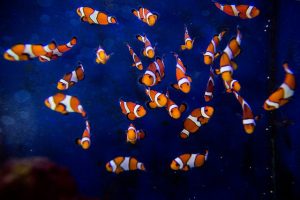A Day at the Beach for Central Campus Marine Biology
 World Oceans Day is June 8th. Since school will be out for the summer by then the renowned Central Campus Marine Biology program decided to observe the occasion on Thursday by setting up an array of student exhibits in the cafeteria/commons area.
World Oceans Day is June 8th. Since school will be out for the summer by then the renowned Central Campus Marine Biology program decided to observe the occasion on Thursday by setting up an array of student exhibits in the cafeteria/commons area.
Teacher Greg Barord and his, uh, school of pupils were all decked out in marine bio t-shirts (printed by the Central Campus graphic design program) with the following mantra emblazoned on the back: “Where Every Week is Shark Week.” Those were for sale @ $10 as were program water bottles @ $5. Proceeds go toward meal money for the fish upstairs in their tanks.
Dr. Barord, who is at the forefront of efforts to save the fuzzy nautilus by doing field research to document its dwindling numbers and entitle it to protective regulatory status (they are hunted for their shells), and fellow instructor Kirk Embree took students on a spring break fieldtrip deluxe to Galveston Bay in Texas. Many of the trifold project exhibits derived from findings gathered there. Selfies with bay squid that fit in the palm of a hand, for instance.
Lincoln sophomore Hadley Brown was dressed in full-length waders, modeling protective gear that’s recommended when marine biologists get out of their labs and classrooms and into the water.
The topic of another display was feeding time which it happened to be for the exhibitors when we visited. Hadley was patient with her explanations in between bites of her lunch and swigs of chocolate milk.
Plastic pollution of the oceans is a growing concern as detailed in still another project.
The most vivid display was a video loop of the amphibious Dr. Barord’s nautilus research expeditions. Standing in the student commons of a landlocked American high school the realization hit that the person standing right next to you has been to thaT Pacific Ocean floor off Papua, New Guinea depicted on the screen in front of you. It makes you feel a little bit closer to the coast.
The research was sponsored by National Geographic, the United States National Science Foundation, The Nature Conservancy, the Minnesota Zoo, the American Museum of Natural History and the Save the Nautiluses Foundation.
If you’re interested in helping a DMPS teacher in his efforts to stave off the extinction of an endangered aquatic species, look here: http://savethenautilus.com/
And don’t forget to observe World Oceans Day on June 8th. They’re closer than you think.




